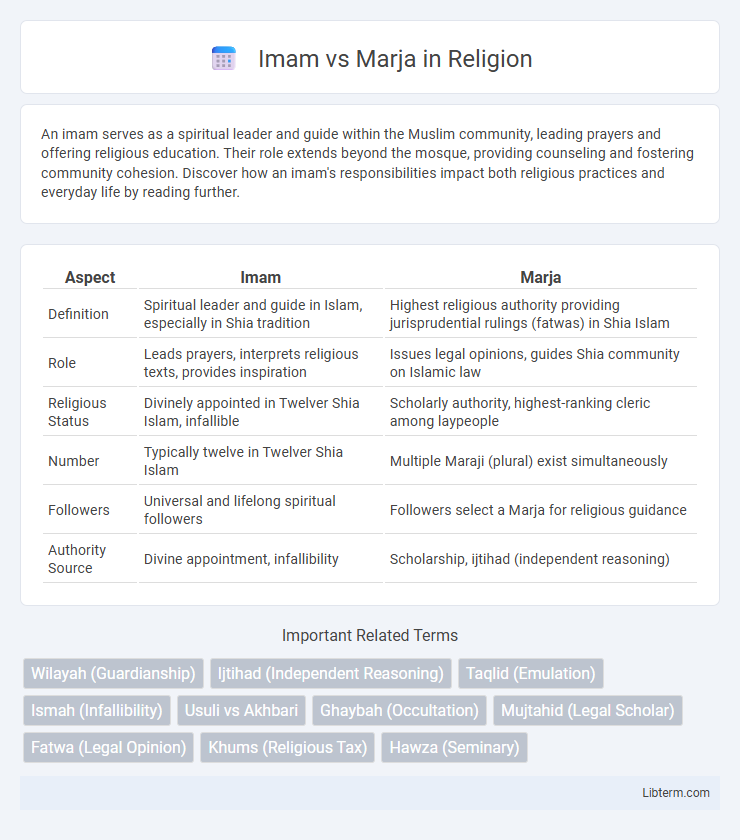An imam serves as a spiritual leader and guide within the Muslim community, leading prayers and offering religious education. Their role extends beyond the mosque, providing counseling and fostering community cohesion. Discover how an imam's responsibilities impact both religious practices and everyday life by reading further.
Table of Comparison
| Aspect | Imam | Marja |
|---|---|---|
| Definition | Spiritual leader and guide in Islam, especially in Shia tradition | Highest religious authority providing jurisprudential rulings (fatwas) in Shia Islam |
| Role | Leads prayers, interprets religious texts, provides inspiration | Issues legal opinions, guides Shia community on Islamic law |
| Religious Status | Divinely appointed in Twelver Shia Islam, infallible | Scholarly authority, highest-ranking cleric among laypeople |
| Number | Typically twelve in Twelver Shia Islam | Multiple Maraji (plural) exist simultaneously |
| Followers | Universal and lifelong spiritual followers | Followers select a Marja for religious guidance |
| Authority Source | Divine appointment, infallibility | Scholarship, ijtihad (independent reasoning) |
Understanding the Terms: Imam and Marja
Imam in Islamic tradition refers to a spiritual leader and guide, often regarded as a divinely appointed authority with deep religious knowledge. Marja, short for Marja' al-Taqlid, denotes a high-ranking Shia authority whose religious rulings and interpretations are followed by believers for guidance in daily and spiritual matters. Understanding these terms highlights the distinction between an infallible leader (Imam) and a scholarly source of emulation (Marja) within Shia Islam.
Historical Origins of Imamate and Marja’iyya
The historical origins of Imamate trace back to the succession of Prophet Muhammad, emphasizing divinely appointed leadership in Shia Islam, notably established with Ali ibn Abi Talib as the first Imam. Marja'iyya emerged later as a system of religious authority during the Safavid era, granting Marjas the role of interpreting Sharia and providing legal verdicts (fatwas) for Twelver Shia communities. This distinction highlights Imams as infallible spiritual leaders, while Marjas function as learned jurists guiding everyday religious practice.
Theological Foundations: Imam vs Marja
Imams in Shia Islam are divinely appointed, infallible leaders believed to possess divine knowledge and authority as successors of the Prophet Muhammad, serving as spiritual and temporal guides. Marjas, or Marja' Taqlids, are high-ranking scholars who provide religious guidance and jurisprudential rulings based on interpretations of Islamic law, but they lack the divine infallibility attributed to Imams. Theologically, Imams hold a unique, sacred status as divinely chosen leaders, whereas Marjas function as human scholars whose authority derives from scholarly expertise and community recognition.
Roles and Responsibilities Compared
Imams serve as spiritual leaders guiding the Muslim community in prayer, interpretation of the Quran, and religious teachings, often holding roles tied to mosques or particular congregations. Marjas, primarily within Shia Islam, act as supreme religious authorities whose responsibilities include issuing fatwas, providing jurisprudential guidance, and serving as sources of emulation in matters of Islamic law and ethics. While Imams focus on immediate community leadership and worship facilitation, Marjas hold broader responsibilities influencing theological doctrine and legal interpretations across global Shia populations.
Religious Authority and Spiritual Guidance
Imams in Shia Islam serve as divinely appointed leaders possessing both religious authority and spiritual guidance, believed to be infallible and possessing deep theological knowledge. Marjas, or Marja-e-Taqlid, are high-ranking clerics recognized as sources of emulation who provide legal rulings and guidance based on Islamic jurisprudence to the Shia community. While Imams embody ultimate spiritual authority, Marjas function as accessible religious authorities guiding followers in everyday ethical and legal matters.
Selection and Recognition Processes
The selection process of an Imam in Shia Islam is traditionally based on divine appointment and lineage, especially within the Twelve Imams, who are believed to be chosen by God and recognized through clear signs and prophetic endorsement. In contrast, Marjas, or Marja' taqlid, are senior scholars selected through scholarly consensus (ijma) and peer recognition based on their deep knowledge of Islamic jurisprudence and ethical conduct. The recognition of a Marja involves public acceptance by followers who emulate their religious rulings, whereas an Imam's authority is inherently spiritual and hereditary.
Influence on Shia Muslim Communities
Imams, regarded as divinely appointed leaders in Shia Islam, hold spiritual and religious authority that shapes core beliefs and practices within the community. Marjas serve as sources of emulation, providing guidance in jurisprudence and daily life, influencing legal interpretations and ethical conduct among Shia Muslims. The combined influence of Imams and Marjas sustains doctrinal unity and social cohesion in Shia communities worldwide.
Key Differences in Leadership Functions
Imams in Shia Islam serve as divinely appointed spiritual leaders with authority over religious interpretation, guidance, and infallibility, while Marjas function as highest-ranking jurists providing legal rulings and practical religious guidance to followers. Imams possess supreme, unquestionable leadership rooted in divine authority, whereas Marjas derive their influence through scholarship and consensus within the clerical hierarchy. The Imam's role encompasses both spiritual and temporal leadership, contrasting with the Marja's specialized focus on jurisprudential expertise and issuing fatwas.
Contemporary Significance and Challenges
Imams in Shia Islam serve as divinely appointed spiritual leaders with established authority, while Marjas represent contemporary religious scholars recognized for their expertise in Islamic law and guidance. The contemporary significance of Marjas lies in their roles as sources of emulation, addressing modern socio-political issues and providing legal opinions (fatwas) relevant to current contexts. Challenges faced by both include maintaining religious authority amidst globalization, differing interpretations, and the integration of traditional doctrine with contemporary societal dynamics.
Conclusion: Imam and Marja in Modern Context
Imams serve as spiritual leaders with direct religious authority and divine guidance in Shia Islam, while Marjas are recognized for their expertise in Islamic jurisprudence, providing legal rulings and practical religious guidance for contemporary issues. In the modern context, Marjas address evolving societal challenges through ijtihad, influencing daily practices without the infallible status attributed to Imams. Understanding both roles highlights the dynamic interaction between divinely inspired leadership and scholarly interpretation within Shia communities today.
Imam Infographic

 libterm.com
libterm.com